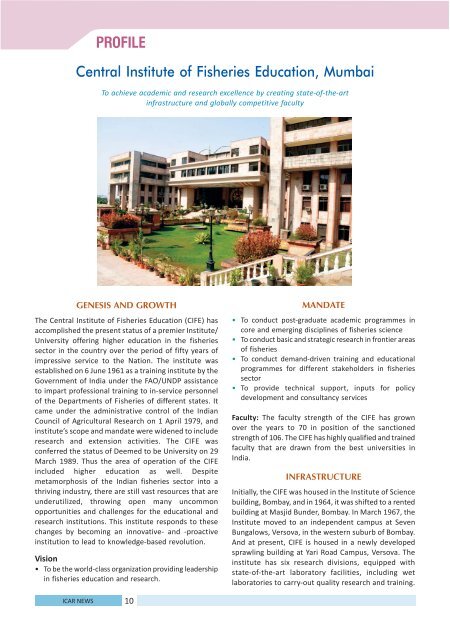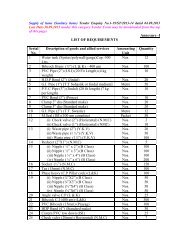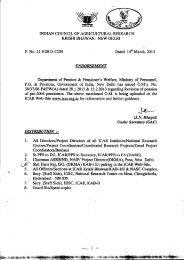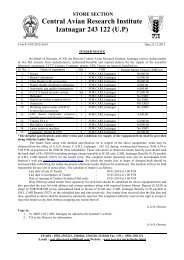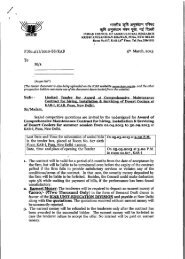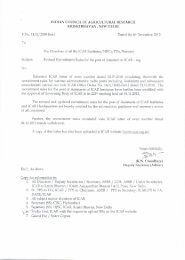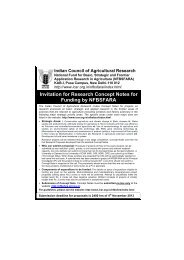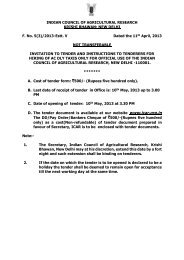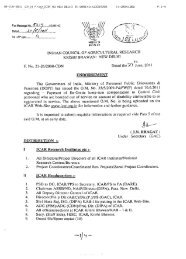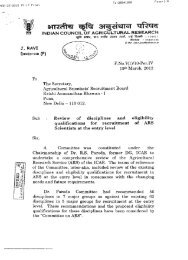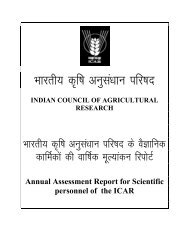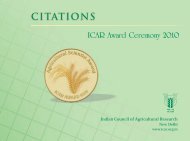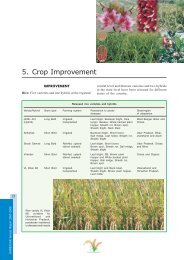Volume 18 no. 4 October- December 2012 - Indian Council of ...
Volume 18 no. 4 October- December 2012 - Indian Council of ...
Volume 18 no. 4 October- December 2012 - Indian Council of ...
Create successful ePaper yourself
Turn your PDF publications into a flip-book with our unique Google optimized e-Paper software.
ICAR NEWS<br />
PROFILE<br />
Central Institute <strong>of</strong> Fisheries Education, Mumbai<br />
To achieve academic and research excellence by creating state-<strong>of</strong>-the-art<br />
infrastructure and globally competitive faculty<br />
GENESIS AND GROWTH<br />
The Central Institute <strong>of</strong> Fisheries Education (CIFE) has<br />
accomplished the present status <strong>of</strong> a premier Institute/<br />
University <strong>of</strong>fering higher education in the fisheries<br />
sector in the country over the period <strong>of</strong> fifty years <strong>of</strong><br />
impressive service to the Nation. The institute was<br />
established on 6 June 1961 as a training institute by the<br />
Government <strong>of</strong> India under the FAO/UNDP assistance<br />
to impart pr<strong>of</strong>essional training to in-service personnel<br />
<strong>of</strong> the Departments <strong>of</strong> Fisheries <strong>of</strong> different states. It<br />
came under the administrative control <strong>of</strong> the <strong>Indian</strong><br />
<strong>Council</strong> <strong>of</strong> Agricultural Research on 1 April 1979, and<br />
institute’s scope and mandate were widened to include<br />
research and extension activities. The CIFE was<br />
conferred the status <strong>of</strong> Deemed to be University on 29<br />
March 1989. Thus the area <strong>of</strong> operation <strong>of</strong> the CIFE<br />
included higher education as well. Despite<br />
metamorphosis <strong>of</strong> the <strong>Indian</strong> fisheries sector into a<br />
thriving industry, there are still vast resources that are<br />
underutilized, throwing open many uncommon<br />
opportunities and challenges for the educational and<br />
research institutions. This institute responds to these<br />
changes by becoming an in<strong>no</strong>vative- and -proactive<br />
institution to lead to k<strong>no</strong>wledge-based revolution.<br />
Vision<br />
• To be the world-class organization providing leadership<br />
in fisheries education and research.<br />
10<br />
MANDATE<br />
• To conduct post-graduate academic programmes in<br />
core and emerging disciplines <strong>of</strong> fisheries science<br />
• To conduct basic and strategic research in frontier areas<br />
<strong>of</strong> fisheries<br />
• To conduct demand-driven training and educational<br />
programmes for different stakeholders in fisheries<br />
sector<br />
• To provide technical support, inputs for policy<br />
development and consultancy services<br />
Faculty: The faculty strength <strong>of</strong> the CIFE has grown<br />
over the years to 70 in position <strong>of</strong> the sanctioned<br />
strength <strong>of</strong> 106. The CIFE has highly qualified and trained<br />
faculty that are drawn from the best universities in<br />
India.<br />
INFRASTRUCTURE<br />
Initially, the CIFE was housed in the Institute <strong>of</strong> Science<br />
building, Bombay, and in 1964, it was shifted to a rented<br />
building at Masjid Bunder, Bombay. In March 1967, the<br />
Institute moved to an independent campus at Seven<br />
Bungalows, Versova, in the western suburb <strong>of</strong> Bombay.<br />
And at present, CIFE is housed in a newly developed<br />
sprawling building at Yari Road Campus, Versova. The<br />
institute has six research divisions, equipped with<br />
state-<strong>of</strong>-the-art laboratory facilities, including wet<br />
laboratories to carry-out quality research and training.


